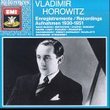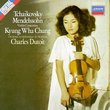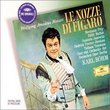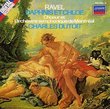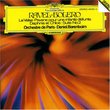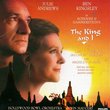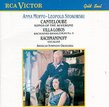| All Artists: George Frederick Handel, Nikolaus Harnoncourt, Concentus Musicus Wien, Christine Schäfer, Michael Schade Title: Handel: Messiah [Hybrid SACD] Members Wishing: 0 Total Copies: 0 Label: RCA Original Release Date: 1/1/2005 Re-Release Date: 11/1/2005 Album Type: Hybrid SACD - DSD Genre: Classical Styles: Opera & Classical Vocal, Historical Periods, Baroque (c.1600-1750), Symphonies Number of Discs: 2 SwapaCD Credits: 2 UPC: 828767203928 |
Search - George Frederick Handel, Nikolaus Harnoncourt, Concentus Musicus Wien :: Handel: Messiah [Hybrid SACD]
![Handel: Messiah [Hybrid SACD]](https://nationalbookswap.com/cd//l/00/1100/6131100.jpg) | George Frederick Handel, Nikolaus Harnoncourt, Concentus Musicus Wien Handel: Messiah [Hybrid SACD] Genre: Classical
This is an unusual performance of Handel's great Messiah. Harnoncourt always has something up his sleeve in his interpretations, and the results are often mixed, as they are here. Some tempi are oddly slow, others wackily ... more » |
Larger Image |
CD DetailsSynopsis
Amazon.com This is an unusual performance of Handel's great Messiah. Harnoncourt always has something up his sleeve in his interpretations, and the results are often mixed, as they are here. Some tempi are oddly slow, others wackily fast, but that keeps us on our toes. The choral sound is very delicate and gentle--is this to denote piety? Whatever the desire, those who like their choral sound full-bodied are bound to be left befuddled by the lack of potency they'll hear here--the "Hallelujah" Chorus begins so modestly you'll think it is a rehearsal, but it grows in effect as it goes on. Very odd. Furthermore, the only really excellent soloists are soprano Christine Schaefer and baritone Gerald Finley; the others are good but peculiarly, like the chorus, lack profile. The recorded sound is glorious--there's not a note that's not clear--but there are plenty of finer, and more interesting Messiahs available. --Robert Levine Similarly Requested CDs
|
CD ReviewsHarnoncourt & Messiah 2: Polish, Velvet, Platinum, Pearls Dan Fee | Berkeley, CA USA | 12/07/2005 (3 out of 5 stars) "One comes to this new SACD performance of Handel's Messiah with high hopes. Conductor Nikolaus Harnoncourt and the Concentus Musicus Wien have a well-deserved buzz for being musical pioneers who blazed new and interesting trails in the early music, period performance, and period instrument movements. One of the more interesting period instrument Messiah's has long been Harnoncourt's earlier effort, captured on red book 16-bit CD. A glance over the four soloists raises our hopes further. Soprano Christine Schafer has just the silver bell voice that can ring out joy in Messiah's arias, a possible equal of one of my great favs, Elly Ameling, or another fav, Arlene Auger. Tenor Michael Schade, ditto. One expects a lot of him just on recorded reputation so far. Will he stand tall in the heraldic line that includes singers like Richard Lewis, Philip Langridge, John Aler, Jon Vickers? Mezzo Anna Larsson steps up, with the memories of really great altos hanging in the balance - the likes of Janet Baker, Yvonne Minton, Anna Reynolds, Anne Sophie von Otter, Helen Watts. Finally, we come to bass baritone Gerald Finley. He, too, might stand in honor of a lineage that has included the likes of Gorgio Tozzi, Gwynne Howell, Bejamin Luxon, Nathan Berg, Alastair Miles, John Cheek, John Tomlinson, Justino Diaz - and one of the great recorded treats, Bryn Terfel in the Chandos / Collegium 90 recording. No recording of Messiah can fail to take account of the chorus. The Schoenberg Chorus have done very fine work on other recordings - including a cherished Harnoncourt-led (earlier, with Gruberova) Haydn Creation that still sits on my fav shelf. One wonders how they will fare here? Well, here is the score card, with comments. Given high hopes, this entirely competent performance disappoints. The high resolution sound is captured very well, at rather mid-hall position in the famous Vienna venue. Surround sound channels only make more obvious what is mainly missing from this one: Commitment, energy. If you want to hear Messiah in original instruments, you can go to several other recorded versions, and get a less soporific experience of the work. Messiah is a holiday music tradition, true, in many parts of the world. But it was - and still is, actually - an innovative and controversial work that broke new ground for oratorio (especially in English), for setting sacred texts, and for showing that a work of sheer musical genius that towers high in the genre could also be wildly popular. The major period performance competitors include: Valentin Radu / Ama Deus Ensemble on Vox, Suzuki / Japan Bach Collegium on BIS, Gardiner / Monteverdi Choir on DGG, Pinnock / English Concert on DGG (Arlene Auger), Ton Koopman / Amsterdam Baroque (inactive), Scholars on Naxos, and Hickox / Collegium 90 on Chandos. As a Messiah fan who listens to this music all year round, I can get more heart and more excitement out of any of the competing alternative sets than I can hear in this second outing by Harnoncourt and company. My momentary favs are circling around Radu - probably the punchiest period instrument version so far, capturing an edgy fire that belies its budget price as well as its local cast of Philadelphia unfamous singers and players; and, of course, the Collegium 90 set with the amazing Bryn Terfel, caught in peak form way before he became famous and possibly over-exposed in cross-over pop classics; and thirdly the thrilling, committed version by William Christie / Les Arts Florissant on Harmonia Mundi. There is nothing terribly wrong with the second Harnoncourt, here, except that it should have been so much better than it actually turned out to be. The chorus is fine, and so are the soloists. Nobody is beneath the music in the technical sense. But the whole business is so entirely customary, polished, and uneventful that it reminds me of all those gala opening nights at the symphony where the real point is to dress up, raise money, and show just how glamorously involved everybody is. This Harnoncourt occasion is all dressed up in black velvet and pearls - and misses the musical point of Messiah by just that much. A legendary exchange in conversation between one of the British nobility and the composer captures the point. Lord so-and-so supposedly remarked to Handel, after attending one Messiah performance, that it had all been a pretty fine affair, socially and musically very entertaining. Handel's reply was to the effect that he hoped not only to entertain his audience, but to actually make them better people. Listening to this newest Harnoncourt offering doesn't make me better. Given the simply huge talents it tapped for its members, I am curmudgeonly enough and onery enough to still think that it should. So, disappointing. Three stars at regular and forgetful best. If you want to widen the circle to include regular instrument performances, you get access to really wonderful alternatives that have hung around in the CD catalogues for some time. My favs from this large group currently include: Mackerras / Ambrosian Singers on EMI; Robert Shaw / Singers on Sony BMG; Westenburg / Musica Sacra on Sony BMG; and the outrageous but zingy Beecham / RPO on Sony BMG. Somary / Amor Artis is currently out of catalogue; but Artemis Classics is re-issuing much of the old Vanguard Recording Society catalogue, often in stunning 5.1 Dolby Digital remixed sound - so keep an eye out. Put one of the richly sung and lively alternatives on the player, then. Sit back, and let yourself get lost for about two hours in just how amazing this oratorio really is. If you pay attention, you will surely conclude that Handel wrote an enduring masterpiece that is better than it ever can be played and sung, on any given occasion. (Schnabel talking about the Beethoven sonatas.) Or, as Beethoven said, gesturing towards a manuscript of Handel's Messiah, There lies the truth." Good performance, well recorded Virginia Opera Fan | Falls Church, VA USA | 12/12/2005 (4 out of 5 stars) "I like this recording despite some interpretative details that have proved mannered on repeated listening. With Harnoncourt leading the performers, there is always a clear interpretive point of view whether I agree with the immediate choices or not. I remember an interview some years back in which Harnoncourt explained his gentle treatment of the end of "His yoke is easy." He said that the typical near screaming of references to easy yokes and light burdens is not in keeping with the text. So agree or not the interpretation flows from a point of view and not generalized "performance practice". There are times, however, when the strongly rhetorical renderings of the airs create too great contrast with the rather traditional choral work. As an example, the emphatic "But who may abide" is followed by a comfortably ambling performance of the chorus "And He shall purify". Although not as pronounced as Jacobs lightening of effect, "For unto us" displays a similar mincing of the choral acclamations, particularly "Prince of Peace". I suppose one can argue it reflects the text. Perhaps taking his cue from Handel's reported "vision of heaven" to his servant, Harnoncourt begins "Hallelujah" in a almost dream-like state, holding back the fireworks for the conclusion. The listener will have to decide for themselves whether it works or not. The Schoenberg Choir is clearly a virtuoso ensemble and makes a very strong contribution to the proceedings. Unfortunately, in common with many German speaking choirs, they sing in accented English that can be a little irritating. The English "s" sound (is, his, this, etc.) usually comes out as the double s sound in "hiss". Vowels are sometimes distorted as well. Concerning the soloists, the ladies are good, but that problem of germanic diction is somewhat intrusive. I am impressed by the men. The vibrant voices of the tenor and bass recall the more sensuous sounds and heroic manner of bygone days. Finley, is, I believe, the only native Anglophone in the group. The orchestra blends precision and beguiling tone with the tanginess of period instruments. We've come a long way from the sawing, scraping and surging that passed for historic performance even a few years ago. The SACD multi channel sound is satisfying. There is a nice stereo image without a hole in the middle and the rear channels are restricted to subtle hall ambience - no instruments sprinting to the back of the hall in this recording. I downgrade the overall rating because of some interpretive details and my irritation with some of the pronunciation. Contrary to some comments, this recording isn't the first to give us Handel's unedited setting of the word "incorruptible" (in "The trumpet shall sound") with the accent on the "tib". Hogwood did it in his late 1970s/early 1980s version as did Parrott on Virgin Classics and Suzuki on BIS. Hogwood raised critical hackles and one suggestion that the bass soloist should be banned from singing in English for a year!" Always vivacious Gerald | San Diego, CA | 12/08/2005 (5 out of 5 stars) "I must admit, I am an Harnoncourt fan, especially after having spoken with the maestro in person and saw his post-concert enthusiasm first hand. I admire his pioneer work in period performances and going to the sources (Urtext) when possible. Two other reviewers weren't thrilled with this recording, which is hardly a surprise given the old warhorse recordings that they prefer. This is a lively interpretation and not "slimmed down" - it doesn't sound like Mahler (nothing against Mahler of course). Harnoncourt is always an adventure and sometimes challenges hearing habits."
|

 Track Listings (47) - Disc #1
Track Listings (47) - Disc #1